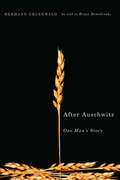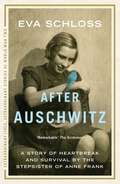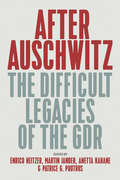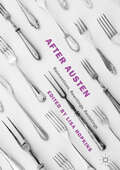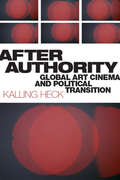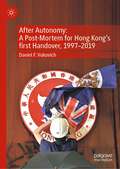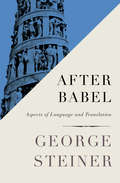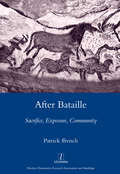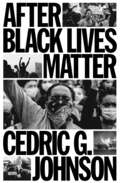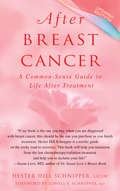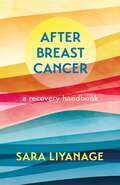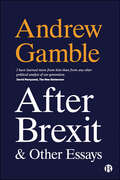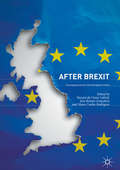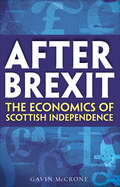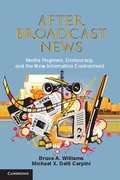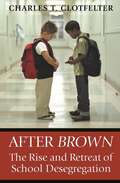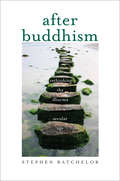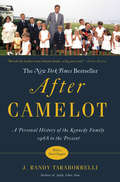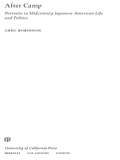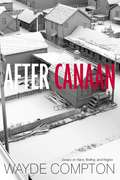- Table View
- List View
After Auschwitz
by Hermann Gruenwald Bryan DemchinskyGruenwald paints his life story onto the larger canvas of some of the great conflicts and movements of the twentieth century. He offers a vivid portrayal of growing up affluent and Jewish in class-conscious Hungary in the interwar period and of the initial promise and disillusioning reality of Hungarian communism.
After Auschwitz: A Story of Heartbreak and Survival by the Stepsister of Anne Frank
by Eva SchlossEva was arrested by the Nazis on her fifteenth birthday and sent to Auschwitz. Her survival depended on endless strokes of luck, her own determination and the love and protection of her mother Fritzi, who was deported with her. When Auschwitz was liberated, Eva and Fritzi began the long journey home. They searched desperately for Eva's father and brother, from whom they had been separated. The news came some months later. Tragically, both men had been killed. Before the war, in Amsterdam, Eva had become friendly with a young girl called Anne Frank. Though their fates were very different, Eva's life was set to be entwined with her friend's for ever more, after her mother Fritzi married Anne's father Otto Frank in 1953. This is a searingly honest account of how an ordinary person survived the Holocaust. Eva's memories and descriptions are heartbreakingly clear, her account brings the horror as close as it can possibly be. But this is also an exploration of what happened next, of Eva's struggle to live with herself after the war and to continue the work of her step-father Otto, ensuring that the legacy of Anne Frank is never forgotten.
After Auschwitz: A story of heartbreak and survival by the stepsister of Anne Frank (Extraordinary Lives, Extraordinary Stories of World War Two #1)
by Eva SchlossEva was arrested by the Nazis on her fifteenth birthday and sent to Auschwitz. Her survival depended on endless strokes of luck, her own determination and the love and protection of her mother Fritzi, who was deported with her.When Auschwitz was liberated, Eva and Fritzi began the long journey home. They searched desperately for Eva's father and brother, from whom they had been separated. The news came some months later. Tragically, both men had been killed.Before the war, in Amsterdam, Eva had become friendly with a young girl called Anne Frank. Though their fates were very different, Eva's life was set to be entwined with her friend's for ever more, after her mother Fritzi married Anne's father Otto Frank in 1953.This is a searingly honest account of how an ordinary person survived the Holocaust. Eva's memories and descriptions are heartbreakingly clear, her account brings the horror as close as it can possibly be.But this is also an exploration of what happened next, of Eva's struggle to live with herself after the war and to continue the work of her step-father Otto, ensuring that the legacy of Anne Frank is never forgotten.
After Auschwitz: The Difficult Legacies of the GDR
by Enrico Heitzer, Martin Jander, Anetta Kahane Patrice G. PoutrusFrom the moment of its inception, the East German state sought to cast itself as a clean break from the horrors of National Socialism. Nonetheless, the precipitous rise of xenophobic, far-right parties across the present-day German East is only the latest evidence that the GDR’s legacy cannot be understood in isolation from the Nazi era nor the political upheavals of today. This provocative collection reflects on the heretofore ignored or repressed aspects of German mainstream society—including right-wing extremism, anti-Semitism and racism—to call for an ambitious renewal of historical research and political education to place East Germany in its proper historical context.
After Auschwitz: The Difficult Legacies of the GDR
by Enrico Heitzer, Martin Jander, Anetta Kahane Patrice G. PoutrusFrom the moment of its inception, the East German state sought to cast itself as a clean break from the horrors of National Socialism. Nonetheless, the precipitous rise of xenophobic, far-right parties across the present-day German East is only the latest evidence that the GDR’s legacy cannot be understood in isolation from the Nazi era nor the political upheavals of today. This provocative collection reflects on the heretofore ignored or repressed aspects of German mainstream society—including right-wing extremism, anti-Semitism and racism—to call for an ambitious renewal of historical research and political education to place East Germany in its proper historical context.
After Austen: Reinventions, Rewritings, Revisitings
by Lisa HopkinsThis collection of twelve new essays examines some of what Jane Austen has become in the two hundred years since her death. Some of the chapters explore adaptations or repurposings of her work while others trace her influence on a surprising variety of different kinds of writing, sometimes even when there is no announced or obvious debt to her. In so doing they also inevitably shed light on Austen herself. Austen is often considered romantic and not often considered political, but both those perceptions are challenged her, as is the idea that she is primarily a writer for and about women. Her books are comic and ironic, but they have been reworked and drawn upon in very different genres and styles. Collectively these essays testify to the extraordinary versatility and resonance of Austen’s books.
After Authoritarianism: Transitional Justice and Democratic Stability (Political Economy of Institutions and Decisions)
by Monika NalepaTransitional justice – the act of reckoning with a former authoritarian regime after it has ceased to exist – has direct implications for democratic processes. Mechanisms of transitional justice have the power to influence who decides to go into politics, can shape politicians' behavior while in office, and can affect how politicians delegate policy decisions. However, these mechanisms are not all alike: some, known as transparency mechanisms, uncover authoritarian collaborators who did their work in secret while others, known as purges, fire open collaborators of the old regime. After Authoritarianism analyzes this distinction in order to uncover the contrasting effects these mechanisms have on sustaining and shaping the qualities of democratic processes. Using a highly disaggregated global transitional justice dataset, the book shows that mechanisms of transitional justice are far from being the epilogue of an outgoing authoritarian regime, and instead represent the crucial first chapter in a country's democratic story.
After Authority: Global Art Cinema and Political Transition
by Kalling HeckAfter Authority explores the tendency in art cinema to respond to political transition by turning to ambiguity, a system that ideally stems the reemergence of authoritarian logics in art and elsewhere. By comparing films from Italy, Hungary, South Korea, and the United States, this book contends that the aesthetic tradition of ambiguity in art cinema can be traced to post-authoritarian conditions and that it is in the context of a transition away from authoritarianism where art cinema aesthetics become legible. Art cinema, then, can be seen as a mode of cinematic practice that is at its core political, as its constitutive ambiguity finds its roots in the rejection of centralized and hierarchical configurations of authority. Ultimately, After Authority proposes a history of art cinema predicated on the potentials, possibilities, and politics of ambiguity.
After Autonomy: A Post-Mortem for Hong Kong’s first Handover, 1997–2019
by Daniel F. VukovichThis book offers a sharp, critical analysis of the rise and fall of the 2019 anti-extradition bill movement in Hong Kong, including prior events like Occupy Central and the Mongkok Fishball Revolution, as well as their aftermaths in light of the re-assertion of mainland sovereignty over the SAR. Reading the conflict against the grain of those who would romanticize it or simply condemn it in nationalistic fashion, Vukovich goes beyond mediatized discourse to disentangle its roots in the Basic Law system as well as in the colonial and insufficiently post-colonial contexts and dynamics of Hong Kong. He examines the question of localist identity and its discontents, the problems of nativism, violence, and liberalism, the impossibility of autonomy, and what forms a genuine de-colonization can and might yet take in the city. A concluding chapter examines Hong Kong’s need for state capacity and proper, livelihood development, in the light of the Omicron wave of the Covid pandemic, as the SAR goes forward into a second handover era.
After Babel: Aspects of Language and Translation
by George Steiner&“A brilliant work . . . A dazzling meditation on the very nature of language itself&” from the world-renowned scholar and author of The Poetry of Thought (Kirkus Reviews). In his classic work, literary critic and scholar George Steiner tackles what he considers the Babel &“problem&”: Why, over the course of history, have humans developed thousands of different languages when the social, material, and economic advantages of a single tongue are obvious? Steiner argues that different cultures&’ desires for privacy and exclusivity led to each developing its own language. Translation, he believes, is at the very heart of human communication, and thus at the heart of human nature. From our everyday perception of the world around us, to creativity and the uninhibited imagination, to the often inexplicable poignancy of poetry, we are constantly translating—even from our native language.
After Bataille: Sacrifice, Exposure, Community
by Patrick FfrenchAuthor of the obscene narrative Story of the Eye and of works of heretical philosophy such as Inner Experience, Georges Bataille (1897-1962) is one of the most powerful and secretly influential French thinkers of the last century. His work is driven by a compulsion to communicate an experience which exceeds the limits of communicative exchange, and also constitutes a sustained focus on the nature of this complusion. After Bataille takes this sense of compulsion as its motive and traces it across different figures in Batailles thought, from an obsession with the thematics and the event of sacrifice, through the exposure of being and of the subject, to the necessary relation to others in friendship and in community. In each of these instances After Bataille is distinctive in staging a series of encounters between Bataille, his contemporaries, and critics and theorists who extend or engage with his legacy. It thus offers a vital account of the place of Bataille in contemporary thought.
After Black Lives Matter
by Cedric JohnsonContemporary policing reflects the turn from welfare to domestic warfare as the chief means of regulating the excluded and oppressedThe historic uprising in the wake of the murder of George Floyd transformed the way we think about race and policing. Why did it achieve so little in the way of substantive reforms? After Black Lives Matter argues that the failure to leave an institutional residue was not simply due to the mercurial and reactive character of the protests. Rather, the core of the movement itself failed to locate the central racial injustice that underpins the crisis of policing: socio-economic inequality.For Johnson, the anti-capitalist and downwardly redistributive politics expressed by different Black Lives Matter elements has too often been drowned out in the flood of black wealth creation, fetishism of Jim Crow black entrepreneurship, corporate diversity initiatives, and a quixotic reparations demand. None of these political tendencies addresses the fundamental problem underlying mass incarceration.That is the turn from welfare to domestic warfare as the chief means of regulating the excluded and oppressed. Johnson sees the way forward in building popular democratic power to advance public works and public goods. Rather than abolishing police, After Black Lives Matter argues for abolishing the conditions of alienation and exploitation contemporary policing exists to manage.
After Breast Cancer
by Hester Hill SchnipperAs women quickly discover, their life when treatment ends is very different from what it was before their diagnosis. Often exhausted, anxious, and emotionally volatile, they are beset by physical discomforts, fearful of intimacy, afraid for their children, worried about recurrence. Anticipating a return to "normalcy," they discover that the old version of normal no longer applies.There could be no more knowledgeable guide for women embarking on this complicated journey than Hester Hill Schnipper, who is herself both an experienced oncology social worker and a breast cancer survivor. This comprehensive handbook provides jargon-free information on the wide range of practical issues women face as they navigate the journey back to health, including: *Managing physical problems such as fatigue, hot flashes, and aches and pains*Handling relationships: your children, your partner, your parents, your friends.*How to regain emotional and sexual intimacy*Coping with financial and workplace issues*Genetic testing: why, whether, when *How to move beyond the fear of recurrence*And much moreThis indispensable book will help you rediscover your capacity for joy as you move forward into the future--as a survivor.From the Trade Paperback edition.
After Breast Cancer
by Hester Hill Schnipper Lic S W Lowell E. SchnipperAs women quickly discover, their life when treatment ends is very different from what it was before their diagnosis. Often exhausted, anxious, and emotionally volatile, they are beset by physical discomforts, fearful of intimacy, afraid for their children, worried about recurrence. Anticipating a return to “normalcy,” they discover that the old version of normal no longer applies. There could be no more knowledgeable guide for women embarking on this complicated journey than Hester Hill Schnipper, who is herself both an experienced oncology social worker and a breast cancer survivor. This comprehensive handbook provides jargon-free information on the wide range of practical issues women face as they navigate the journey back to health, including: • Managing physical problems such as fatigue, hot flashes, and aches and pains • Handling relationships: your children, your partner, your parents, your friends. • How to regain emotional and sexual intimacy • Coping with financial and workplace issues • Genetic testing: why, whether, when • How to move beyond the fear of recurrence • And much more This indispensable book will help you rediscover your capacity for joy as you move forward into the future—as a survivor.
After Breast Cancer: A Recovery Handbook
by Sara Liyanage'Once treatment stops, and people leave strictly managed clinical environments, survivors feel as though they had "fallen off a cliff edge"... feeling isolated and abandoned at a time when support is needed the most'. - Mental Health Foundation From the final infusion to the five-year check, After Breast Cancer gives a step-by-step support package to coping post-treatment. It follows on from Sara Liyanage's successful coverage of diagnosis and treatment in Ticking Off Breast Cancer, and is driven not only by her experience of illness, but underpinned by contributions from leading oncologists, heads of cancer services, and clinical consultant psychologists. With a readable blend of informality and medically endorsed insight, After Breast Cancer has an optimistic outlook and a reassuring tone, but doesn't flinch from discussing the possibility of secondary cancer, or the full impact of treatment and surgery on you or your loved one. It features a huge amount of practical information, including a full toolkit for navigating the days post-treatment - including breathing exercises, mindfulness meditation, journaling, affirmations and a healthy bedtime routine. Designed for women of all backgrounds, whatever the nature of their diagnosis, this blend of approachability, lived experience and medical insight puts the power firmly back in your hands, as a breast cancer survivor.
After Breast Cancer: A Recovery Handbook
by Sara Liyanage'Once treatment stops, and people leave strictly managed clinical environments, survivors feel as though they had "fallen off a cliff edge"... feeling isolated and abandoned at a time when support is needed the most'. - Mental Health Foundation From the final infusion to the five-year check, After Breast Cancer gives a step-by-step support package to coping post-treatment. It follows on from Sara Liyanage's successful coverage of diagnosis and treatment in Ticking Off Breast Cancer, and is driven not only by her experience of illness, but underpinned by contributions from leading oncologists, heads of cancer services, and clinical consultant psychologists. With a readable blend of informality and medically endorsed insight, After Breast Cancer has an optimistic outlook and a reassuring tone, but doesn't flinch from discussing the possibility of secondary cancer, or the full impact of treatment and surgery on you or your loved one. It features a huge amount of practical information, including a full toolkit for navigating the days post-treatment - including breathing exercises, mindfulness meditation, journaling, affirmations and a healthy bedtime routine. Designed for women of all backgrounds, whatever the nature of their diagnosis, this blend of approachability, lived experience and medical insight puts the power firmly back in your hands, as a breast cancer survivor.
After Brexit and Other Essays
by Andrew Gamble‘Being more like America again and less like Europe is the heart of the UK model of capitalism … [but] there are many respects in which Britain remains unlike America despite its strong appeal to the British political class ...’ In 'After Brexit' Andrew Gamble sets out the economic models and external relationships that Britain has pursued since the Second World War and examines the choices it now faces as it adjusts to life outside of the European Union. This volume brings together this essay with some of Andrew Gamble’s most important and influential writings on British politics and political economy from the last forty years. They reflect on many of the issues that animate British politics, from the relative decline of the economy and the reshaping of the welfare state to the transformation of the Conservative and Labour parties and the changing constitutional order with the devolution of power to Wales, Scotland and Northern Ireland. The volume is introduced by the author and includes his notes on each of the essays as well as an epilogue, which considers their original context and what has changed since. Taken together, the essays in this volume are testament to the acuity of one of Britain’s foremost political thinkers and provide rich insight into debates and ideas that continue to influence British politics and Britain’s place in the world. A companion volume of Andrew Gamble’s essays, The Western Ideology and Other Essays, focusing on political ideas and ideologies, is also available from Bristol University Press.
After Brexit: Consequences for the European Union
by Nazaré da Costa Cabral José Renato Gonçalves Nuno Cunha RodriguesThis topical and important book identifies the short to medium-term economic, financial and social consequences of Brexit. Containing perspectives from leading thinkers across legal, economic and financial fields, it considers both the general effect of UK withdrawal on the European integration process, and the specific impact on the free movement of capital, goods and people. <P><P> Addressing the main areas within both the UK and the EU that can and will be affected by Brexit, including the financial sector, immigration, social rights and social security, After Brexit: Consequences for the European Union will make fascinating reading for all those currently engaged in the study and practice of Law, Economics, Finance, Political Science, Philosophy, History and International Affairs.
After Brexit: The Economics of Scottish Independence
by Gavin McCronePressure for independence remains a major force in Scotland, but the case for it has changed substantially since the referendum of 2014. In the 2016 Brexit referendum, 60 per cent of the Scottish electorate voted to remain part of the European Union– the only part of the UK to reject Brexit so unequivocally. This new analysis takes into account a host of economic issues including deficit, debt, currency, energy (including North Sea oil and gas), pensions, mortgages and the financial sector. It weighs up the advantages of rejoining the EU single market, either as a full EU member or as a member of the EEA, with the disadvantages of a hard border with the rest of the UK. Independence would create opportunities, but it would also bring many thorny problems which the Scottish government, and the Scottish people, would have to face.
After Broadcast News
by Michael X. Delli Carpini Bruce A. WilliamsThe new media environment has challenged the role of professional journalists as the primary source of politically relevant information. After Broadcast News puts this challenge into historical context, arguing that it is the latest of several critical moments, driven by economic, political, cultural and technological changes, in which the relationship among citizens, political elites and the media has been contested. Out of these past moments, distinct 'media regimes' eventually emerged, each with its own seemingly natural rules and norms, and each the result of political struggle with clear winners and losers. The media regime in place for the latter half of the twentieth century has been dismantled, but a new regime has yet to emerge. Assuring this regime is a democratic one requires serious consideration of what was most beneficial and most problematic about past regimes and what is potentially most beneficial and most problematic about today's new information environment.
After Brown: The Rise and Retreat of School Desegregation
by Charles T. ClotfelterThe United States Supreme Court's 1954 landmark decision, Brown v. Board of Education, set into motion a process of desegregation that would eventually transform American public schools. This book provides a comprehensive and up-to-date assessment of how Brown's most visible effect--contact between students of different racial groups--has changed over the fifty years since the decision. Using both published and unpublished data on school enrollments from across the country, Charles Clotfelter uses measures of interracial contact, racial isolation, and segregation to chronicle the changes. He goes beyond previous studies by drawing on heretofore unanalyzed enrollment data covering the first decade after Brown, calculating segregation for metropolitan areas rather than just school districts, accounting for private schools, presenting recent information on segregation within schools, and measuring segregation in college enrollment. Two main conclusions emerge. First, interracial contact in American schools and colleges increased markedly over the period, with the most dramatic changes occurring in the previously segregated South. Second, despite this change, four main factors prevented even larger increases: white reluctance to accept racially mixed schools, the multiplicity of options for avoiding such schools, the willingness of local officials to accommodate the wishes of reluctant whites, and the eventual loss of will on the part of those who had been the strongest protagonists in the push for desegregation. Thus decreases in segregation within districts were partially offset by growing disparities between districts and by selected increases in private school enrollment.
After Buddhism
by Stephen Batchelor<P><P><i>Advisory: Bookshare has learned that this book offers only partial accessibility. We have kept it in the collection because it is useful for some of our members. Benetech is actively working on projects to improve accessibility issues such as these.</i> <P><P>Some twenty-five centuries after the Buddha started teaching, his message continues to inspire people across the globe, including those living in predominantly secular societies. <P><P> What does it mean to adapt religious practices to secular contexts? Stephen Batchelor, an internationally known author and teacher, is committed to a secularized version of the Buddha's teachings. The time has come, he feels, to articulate a coherent ethical, contemplative, and philosophical vision of Buddhism for our age. After Buddhism, the culmination of four decades of study and practice in the Tibetan, Zen, and Theravada traditions, is his attempt to set the record straight about who the Buddha was and what he was trying to teach. <P><P>Combining critical readings of the earliest canonical texts with narrative accounts of five members of the Buddha's inner circle, Batchelor depicts the Buddha as a pragmatic ethicist rather than a dogmatic metaphysician. He envisions Buddhism as a constantly evolving culture of awakening whose long survival is due to its capacity to reinvent itself and interact creatively with each society it encounters. <P><P> This original and provocative book presents a new framework for understanding the remarkable spread of Buddhism in today's globalized world. It also reminds us of what was so startling about the Buddha's vision of human flourishing.
After Camelot: A Personal History of the Kennedy Family--1968 to the Present
by J. Randy TaraborrelliFor more than half a century, Americans have been captivated by the Kennedys - their joy and heartbreak, tragedy and triumph, the dark side and the remarkable achievements. In this ambitious and sweeping account, Taraborelli continues the family chronicle begun with his bestselling Jackie, Ethel, Joan and provides a behind-the-scenes look at the years "after Camelot." He describes the challenges Bobby's children faced as they grew into adulthood; Eunice and Sargent Shriver's remarkable philanthropic work; the emotional turmoil Jackie faced after JFK's murder and the complexities of her eventual marriage to Aristotle Onassis; the the sudden death of JFK JR; and the stoicism and grace of his sister Caroline. He also brings into clear focus the complex and intriguing story of Edward "Teddy" and shows how he influenced the sensibilities of the next generation and challenged them to uphold the Kennedy name. Based on extensive research, including hundreds of exclusive interviews, After Camelot captures the wealth, glamour, and fortitude for which the Kennedys are so well known. With this book, J. Randy Taraborrelli takes readers on an epic journey as he unfolds the ongoing saga of the nation's most famous-and controversial-family.
After Camp
by Greg RobinsonThis book illuminates various aspects of a central but unexplored area of American history: the midcentury Japanese American experience. A vast and ever-growing literature exists, first on the entry and settlement of Japanese immigrants in the United States at the turn of the 20th century, then on the experience of the immigrants and their American-born children during World War II. Yet the essential question, "What happened afterwards?" remains all but unanswered in historical literature. Excluded from the wartime economic boom and scarred psychologically by their wartime ordeal, the former camp inmates struggled to remake their lives in the years that followed. This volume consists of a series of case studies that shed light on various developments relating to Japanese Americans in the aftermath of their wartime confinement, including resettlement nationwide, the mental and physical readjustment of the former inmates, and their political engagement, most notably in concert with other racialized and ethnic minority groups.
After Canaan
by Wayde Compton"Compton pushes us to look beneath the surface--past those comforting tales of nationhood and racial solidarity--to the more nebulous and ever-shifting truth. This is a brilliant and original work that should be mandatory reading for any student of race and history."--Danzy Senna, author of Caucasia After Canaan, the first nonfiction book by acclaimed African Canadian poet Wayde Compton, repositions the North American discussion of race in the wake of the tumultuous twentieth century. Written from the perspective of someone who was born and lives outside of African American culture, it riffs on the concept of Canada as a promised land (or "Canaan") encoded in African American myth and song since the days of slavery. These varied essays, steeped in a kind of history rarely written about, explore the language of racial misrecognition (also known as "passing"), the failure of urban renewal, humor as a counterweight to "official" multiculturalism, the poetics of hip hop turntablism, and the impact of the Obama phenomenon on the way we speak about race itself. Compton marks the passing of old modes of antiracism and multiculturalism, and points toward what may or may not be a "post-racial" future, but will without doubt be a brave new world of cultural perception. After Canaan is a brilliant and thoughtful consideration of African (North) American culture as it attempts to redefine itself in the Obama era.
